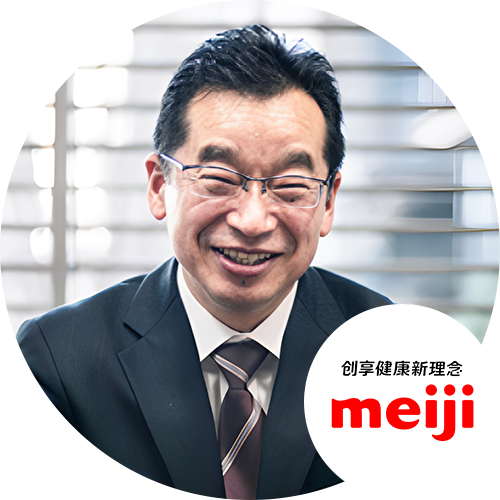
Katsushi Nagamori serves as an Executive Director at Meiji Co., Ltd. and the General Manager of Meiji (China) Investment Co., Ltd. Meiji Co., Ltd. is a food business company under Meiji Holdings, with a history of over 100 years. It produces and sells a wide range of products, including milk, yogurt, chocolate, ice cream, and nutritional foods, generating annual sales exceeding 1 trillion yen (approximately 50 billion RMB), making it one of Japan’s top food companies.
Katsushi Nagamori joined Meiji Dairy Corporation in 1990 and spent over 10 years in the corporate planning departments of both Meiji Co., Ltd. and Meiji Holdings. In these core management divisions, he was actively involved in shaping business strategies and contributing to key decision-making processes. During his tenure, Meiji achieved significant growth in both revenue and profits, securing top market shares across its various business sectors in Japan.
Meiji Group has set a vision to expand its overseas business share to 20% by 2026, with China as a key priority market, driving accelerated investments in the region. To further strengthen its business expansion in China, Nagamori assumed the role of General Manager of the local subsidiary in April 2024. With his passion and decisiveness, he is demonstrating strong leadership and steadily advancing business operations to achieve the company's vision.
Since launching its iconic milk chocolate in 1926, Meiji has shaped Japan's chocolate culture. In the 1970s, playful biscuit-chocolate hybrids like "Kinoko no Yama" and "Takenoko no Sato" became household favorites, generating over ¥23 billion in sales. In the winter of 1992, "Meltykiss" debuted with its signature melt-in-your-mouth texture and seasonal exclusivity—together driving over ¥100 billion in sales. In 2017, the premium "THE Chocolate" series targeted women and high-end markets, selling 30 million bars within six months. Riding the wave of health-conscious trends, Meiji introduced its high-cacao "Chocolate Kouka" line in 2022, highlighting cocoa polyphenol content on the packaging—and swiftly became Japan's No.1 in the high-cacao segment.
From nostalgic classics to premium offerings, from sweet milk to bold dark chocolate, from playful forms to romantic experiences—nearly a century of relentless innovation. Aren’t you curious how they’ve done it?
In today's era of constant change, the food and beverage market is facing unprecedented challenges and opportunities:
· Behind the explosive growth of popular categories lies intensified competition and heightened product homogenization. Brands are trapped in an "exchange price for volume" dilemma, while anxiety over long-term development is growing.
· The rapid evolution of distribution channels is driving transformations in product development and sales models. China's food and beverage market ecosystem is undergoing high-speed iteration, requiring companies to stay agile amid rapid changes.
· Chinese food and beverage brands are accelerating their overseas expansion, with total exports reaching USD 76.5 billion in 2023. However, independent brands still have limited market share abroad. How to break through the Chinese diaspora and penetrate local markets remains a critical challenge for brand globalization.
In this dialogue, we will revisit classic cases of brands achieving breakthroughs against the odds and look ahead to future industry trends:
I. Long-term Business Philosophy
Calbee achieved a V-shaped rebound in sales of its potato sticks, once on the verge of discontinuation, through "differentiated texture." Kirin’s Namacha succeeded in revitalizing its brand, with sales surpassing 100 million units within seven weeks. Meiji leveraged the "cocoa polyphenol" concept to stage a remarkable comeback for its bitter chocolate products, overcoming a 17-year market stagnation.
These examples illustrate how companies, by tapping into deep consumer needs and integrating technology with creativity, drive qualitative leaps in their products and build enduring brands that can thrive for decades or even a century.
II. Channel Survival Strategies
Brands like Want-Want, Jianlibao, and Baixiang have remained vibrant through different eras, thanks to solid brand building and strong product capabilities. In a fast-iterating channel environment, how can a brand evolve into a resilient Chinese brand? How can it carve out a niche amid fierce channel competition and maintain close ties with consumers?
III. From Product Export to Corporate Globalization
Amos has secured its footing in international markets with fun, multi-sensory soft candy designs; Ajinomoto continues to expand its global presence by leveraging its unique positioning across markets worldwide.
Facing common challenges in third-country markets, how can different types of brands formulate differentiated globalization strategies?
How can food and beverage companies learn through competition and co-create through collaboration? This dialogue will offer new perspectives for the industry, helping brands tackle future market challenges and lead a new wave of global growth.

